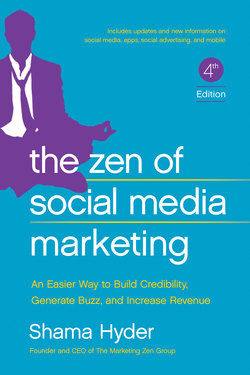Читать книгу The Zen of Social Media Marketing - Shama Hyder - Страница 12
На сайте Литреса книга снята с продажи.
Оглавление4
Social Media Marketing
What You Need to Know Before You Start
“Social media marketing is the process of promoting your site or business through social media channels, and it is a powerful strategy that will get you links, attention, and massive amounts of traffic.”
Maki,
Dosh Dosh
The Nature of the Fun-Loving Beast
Now that you have a solid understanding of online marketing, we can move on to social media marketing. Let’s break down the phrase “social media marketing.”
• Marketing: Promoting a product or a service to increase sales
• Social media: Online platforms where people connect and communicate
Some examples of online platforms are blogs; social networking sites such as Facebook, Twitter, LinkedIn, and Instagram; and video sites such as YouTube.
Most marketers abuse social media platforms. They use them to push their message on people and try to dominate the market. Remember our discussion about the mistake of going against the grain? This is a great example. Marketers who abuse social media usually do so because they are used to using traditional marketing methods like television. You can’t talk back to the TV. (Well, you can, but it doesn’t get you very far.) With social media, talking back is the whole point; it’s a conversation, not a monologue.
What Social Media Is All About
I chose to explore the social web as a business framework after reading Tim Berners-Lee’s talk honoring Vannevar Bush at MIT in 1995, excerpted in part here:
I [have] a dream that the web could be less of a television channel and more of an interactive sea of shared knowledge [and that] by working on this knowledge together we can come to better understandings.
This crystallized for me what social media is all about, conveying the importance of participating with rather than attempting to impress upon your customers. The social web is a place where people gather and share to improve their condition. As marketers, it is our obligation to respect this fundamental premise. It is our gain when we do and our loss when we don’t.
Dave Evans,
author of Social Media Marketing: An Hour a Day
Chapter 1 discusses how traditional marketing has evolved over the years. Now let’s take a look at a table of descriptive words and phrases that compares traditional marketing and online marketing—specifically, social media marketing.
| Traditional Marketing | Online Marketing/Social Media Marketing |
| Dominate the market | Create a community within the market |
| Shout out loud | Listen, and then whisper |
| Me, me, me | Us, us, us |
| Push the product or service | Pull in people with your message/story |
| Advertising | Word of mouth |
| Control | Allow |
| Pursue “leads” | Nurture relationships |
Why Social Media Marketing? Why Bother?
According to multiple surveys and studies, between 49 and 90 percent of web users have made a purchase based on recommendations they received through a social media site—an impressive percentage even at the low end. Roughly 40 percent of small businesses have a Facebook page, and many fewer use other social media platforms (a little over 10 percent use Twitter). Marketers are missing out on a huge opportunity to connect with potential customers. Social media marketing is a good idea for the following three reasons.
1. Social media sites are where the people are. Let’s say there was an expo happening with 1.55 billion attendees, and I offered you a free booth. Would you take it? I sure hope you would. That’s how many people are using Facebook. If Facebook were a country, it would be the most populous nation on Earth. And it costs nothing to join.
2. Trust in advertising continues to erode. Let’s face it. We trust our friends more than we trust what the nice folks on TV tell us. You can either be that friend or you can be the voice on TV that gets ignored. The call is yours. But you can’t fake it. Because of the transparent nature of social media, you can’t really hide who you are for long. Let’s say a company pretends that they value their customers more than anything. Then they turn around and treat a customer badly. That customer has a voice. Chances are she has a Facebook profile or Twitter account. Even if she doesn’t, she may tell a friend who does.
3. People are already talking about you. That last example tells us something else, too: people are already talking about your products, your service, and your company. It’s inevitable. Social communities are breeding grounds for interaction. The only choice you have is whether you join the conversation. Every individual who interacts with your company has the potential to become a champion or a critic. You get to determine which one they become.
